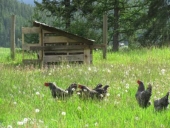posted 1 year ago
I have all of those things and although not specifically quantifiable, I think they do help some.
Avoiding monoculture even in my small-scale gardens also helps. For example, twenty squash plants dispersed across the garden rather than all together in a "squash patch" noticeably decreases the pest and disease pressure on any one plant, varied species apparently act as camouflage for each other. Along that same line, allowing weeds to seemingly overwhelm corn sprouts prevents them from being pulled up by crows. When the corn is big enough to be out of danger the weeds can be pulled and dropped as mulch, where upon the corn explodes into growth and hogs all the nutrients, water and light, nothing else is needed for the rest of the season.
I created a new brassica vegetable I call broccol-ish that produces an abundant harvest while it's still too cold for cabbage flies to be an issue. If the worms want to eat the leaves after the weather warms up, fine with me. The only important thing then is the seed pods, and they don't bother them. The clouds of white and yellow butterflies are beautiful and they pollinate everything else.
I employ various other effective practices as well but still, I doubt I'll ever be able to say I have no pest problems at all, but I look at the same as I do disease problems. Pests and diseases are just part of the natural world. Eliminating them completely isn't necessary and I suspect in the long run might even be counterproductive. As long as I get my harvest anyway, I don't have a problem. I view it more as a balance, a compromise, a peace treaty of sorts.
Nothing ruins a neighborhood like paved roads and water lines.







